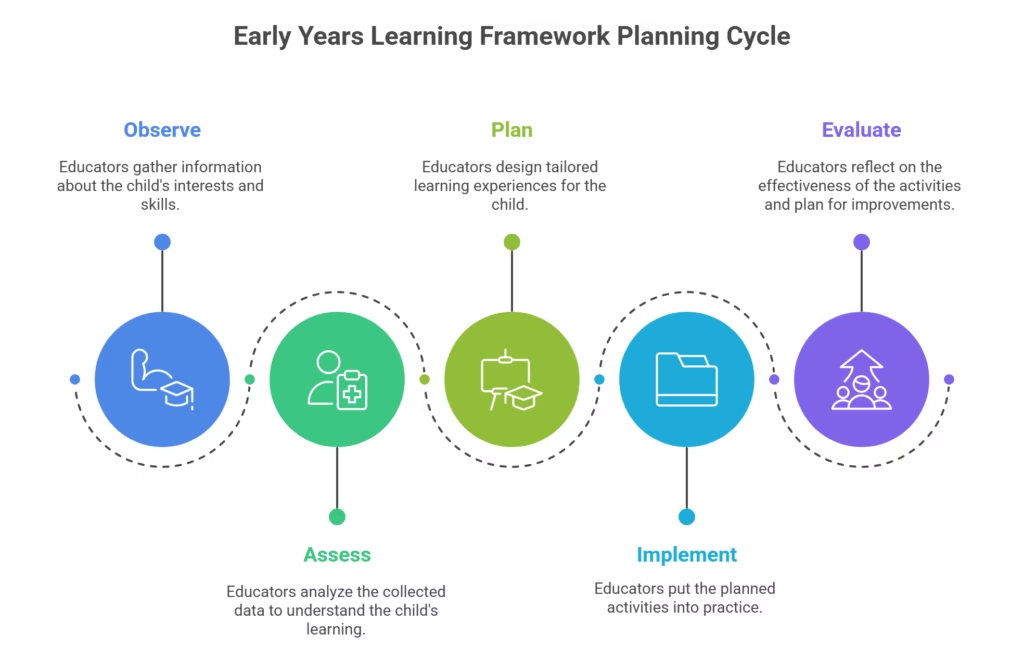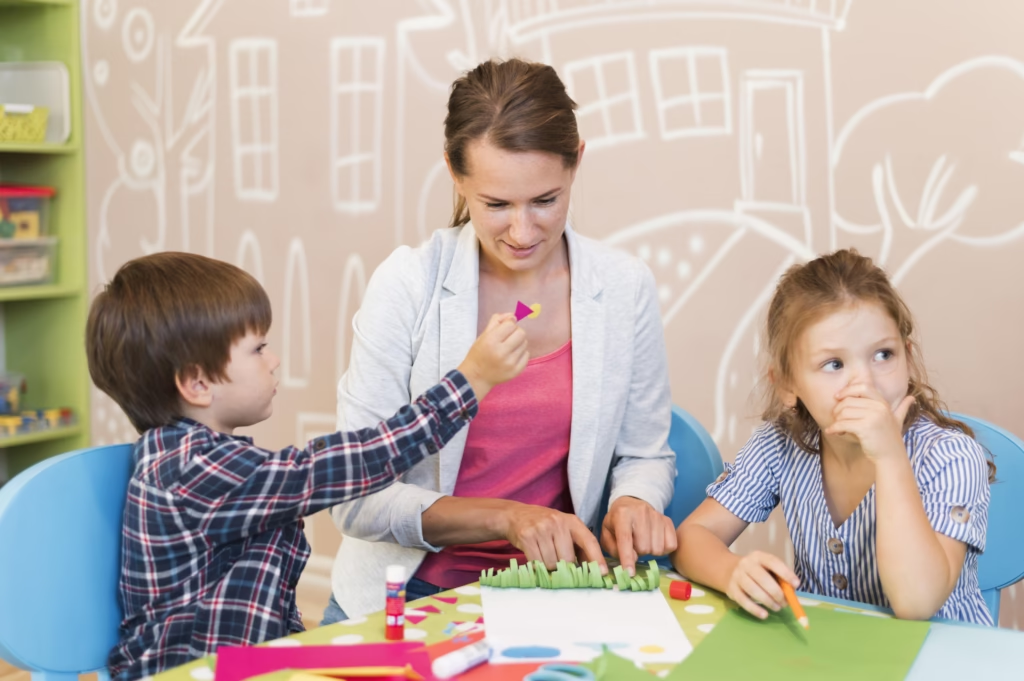The way quality early learning centres guide and support a child’s development is underpinned by a thoughtful and structured process known as the Early Years Learning Framework (EYLF) planning cycle. This is more than just “planning.” It’s a continuous loop of observation, assessment, planning, implementation, and evaluation that helps educators design meaningful experiences for each child.
You might also hear it referred to as the childcare planning cycle or the early childhood planning cycle—and these terms all point to the same powerful, cyclical process. To understand the foundation behind this framework, read our guide on Belonging, Being & Becoming — the foundation of EYLF.
In this blog, we’ll walk you through each stage of the cycle and explain how educators use it to support your child’s learning journey.

Observe
The first step in the cycle is observation. Educators gather information about a child’s current interests, skills, strengths, experiences, and cultural background. This means watching closely how they play, how they interact, what they choose to do, and how they communicate. Quality centres also involve families in this process—after all, parents know their child’s world outside the centre best.
By observing, educators gain insights into things like whether the child shows curiosity about building towers with blocks. Are they beginning to ask questions? Do they prefer to explore outdoors? What cultural or family experiences shape their identity? These observations become the foundation of a truly child-centred approach.
Assess
Once rich observations are collected, the next stage is assessment. In this phase, educators interpret and analyse the data they have gathered. They seek to answer: What is the child learning? How are they learning it? What might help them learn more? Analysis is linked to the EYLF learning outcomes so that a child’s experiences and progress fit into broader developmental goals.
Assessment means thinking about the “whole child” — their cognitive, social, emotional, physical, and cultural development — and working closely with families and colleagues to form a clear picture of where each child is at, and where they could go next.
Plan
With a strong understanding of the child’s profile and learning needs, educators move to the planning stage. This is where they design deliberate and meaningful experiences — tailored to the child’s interests, strengths, and background. In everyday talk, you might call this the “programming” or curriculum plan, but it’s really the heart of the childcare planning cycle.
Key features of quality planning include:
- Setting clear goals for learning, aligned with the EYLF outcomes.
- Designing open-ended, play-based experiences that invite exploration, creativity, and problem-solving.
- Setting up learning environments (indoors and outdoors) that excite and challenge the children.
- Engaging families and children in this design: what does your child like? What might interest them next?
- Ensuring all children’s cultural backgrounds and experiences are respected, included, and built upon.
Through this planning, opportunities are created for your child to develop, to try new things, and to lead their own learning, supported by dedicated educators.
Implement
After planning comes implementation — putting those carefully designed experiences into practice in the learning spaces. Implementation means:
- Setting up the learning environment with appropriate resources, materials, and provocations.
- Educators facilitating and supporting children’s play, encouraging them with open-ended questions (“What might happen if you try that?”), offering scaffolds and stepping in sensitively when needed.
- Being flexible and responsive — if a spontaneous interest arises, the program adapts. If something isn’t working, educators shift gears.
- Promoting child agency so your child has choice and control, can test ideas, make mistakes, persist, and succeed.
- Documenting what happens — photos, anecdotes, learning stories — to capture how your child is engaging in the experience.
This approach is fluid and responsive; it’s not a rigid “scripted” program. The teams actively engage with the children during play, observe their responses, and support their explorations, while still allowing them to lead their own learning.
Evaluate
The final stage in the EYLF planning cycle is evaluation. After experiences are implemented, educators reflect: Did the child achieve the goals we set? What evidence do we have of learning? What worked well? What might we need to change or extend? Feedback is also gathered from children, families, and other educators.
Evaluation leads directly back into the cycle: insights from this reflection inform new observations, fresh assessments, and revised plans — and the loop continues. This is how the early childhood planning cycle supports continuous improvement, both for your child’s learning and for the educational program.
Why the Planning Cycle Matters for Your Child
When educators apply the EYLF planning cycle well, your child benefits in many ways:
- Experiences are tailored to their individual needs and interests, not generic “one-size-fits-all.”
- Their voice, ideas, and cultural background are respected and built into their learning.
- Learning is meaningful, purposeful, and connected, rather than random.
- They are provided with opportunities to lead, explore, engage, and reflect — fostering independence, confidence, and curiosity.
- Families are valued partners in the process, so home and centre learning connect.
The program is regularly reviewed and refined, so the learning journey is alive, dynamic, and responsive.
Final Thoughts from Beginnings Early Learners
At Beginnings Early Learners, we strive to ensure everyone — children, families, and educators — is part of this learning loop. Our educators are committed to understanding your child, planning for them, engaging with them, and reflecting on how things are going.
Come visit us in Alfredton or Sunbury — we’d love to show you how the planning cycle comes alive in our classrooms, how your child’s growth is supported every day, and how you as a family are part of the learning story.
Book a tour today! We can’t wait to welcome your family!

